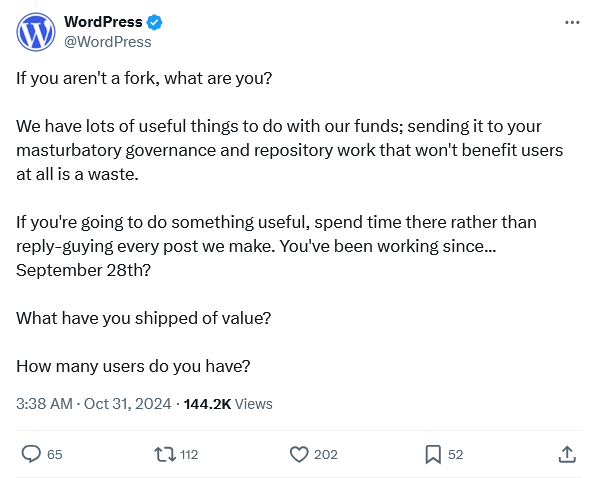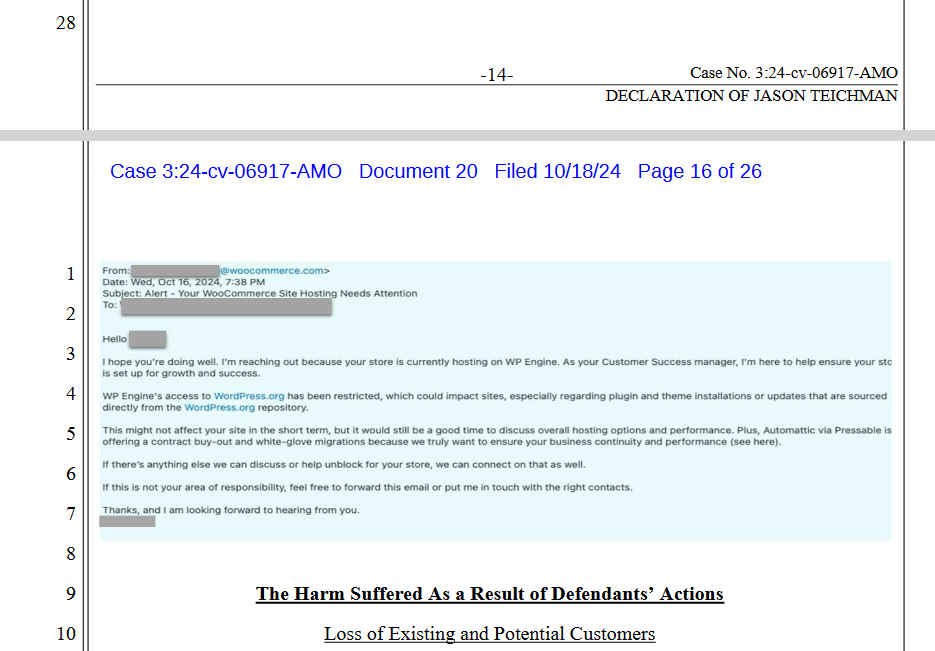There have been forks of @WordPress before: @GetClassicPress@wpengine is basically maintaining a fork right now, they just haven't renamed it. And are violating the WordPresss and WooCommerce trademarks.
— Matt Mullenweg (@photomatt) October 10, 2024
I would welcome more forks! It's part of what makes open source great.
WordPress and WP Engine are in the middle of a blazing open-source soap opera. At the heart of it all? Legal drama, accusations of freeloading, dark email campaigns, and, most recently, talk of a WordPress fork. If you think the world of open-source software is all kumbaya, prepare to be shaken.
The recent spark that reignited tensions came from Automattic CEO and WordPress co-founder Matt Mullenweg himself. Speaking at TechCrunch Disrupt 2024 earlier this week, Mullenweg made it clear he’s not afraid of the prospect of a WordPress fork. He even went as far as to welcome the idea, suggesting that an alternative governance model might actually be beneficial. And he pointed fingers directly at WP Engine, implying they’ve already “forked” WordPress in everything but name.
But it’s not just WordPress feeling the tension in the world of forks. In fact, it looks like forks are in vogue, with developers stepping up to reclaim control over their favorite tools. For instance, Flutter, Google’s popular UI toolkit, is facing its own fork-related drama. A developer recently launched Flutter Flock, a fork aimed at ensuring stability and addressing long-standing community requests. Flutter Flock is positioning itself as a more responsive, community-led alternative to Google’s official toolkit.
If you’re wondering why a fork is even on the table, here’s a quick backstory of this drama: WordPress recently added a checkbox asking contributors to disclose if they’re associated with WP Engine. This policy rubbed some contributors the wrong way, especially long-time supporters who felt this move unfairly targeted them. When one user lamented this policy on X, others chimed in, joking that it was only a matter of time until a new version of WordPress would emerge.
Mullenweg, not one to shy away from the conversation, jumped in, suggesting that WP Engine is already maintaining a “fork” of WordPress due to their deviations from the core platform. His message? “If you’re gonna make a fork, just go ahead and do it.” And that’s when the idea of forking WordPress really started gathering momentum.
The “not our forking problem” post
And then came the post on X from the official WordPress account. WordPress openly mocked WP Engine’s contributions — or the lack thereof, as they see it. The post, which has seemingly been taken down, questioned WP Engine’s contributions and user base but it wasn’t just an offhand comment. It was a direct challenge, dripping with sarcasm and just a touch of, let’s say, “saltiness.”
“If you aren’t a fork, what are you?” the post began. It then went on to dismiss WP Engine’s work on governance and repository management as “masturb*****,” a harsh and highly unfiltered choice of words. It didn’t stop there. The post ended by questioning what value WP Engine had shipped since its founding date, implying WP Engine has been all talk and no substance.

Was this an “acceptable representation” of WordPress? Fans on Reddit debated it, some cheering on the boldness, others cringing at the lack of professionalism. Regardless, it’s clear WordPress wasn’t holding back.
WordPress takes WP Engine to court
The animosity didn’t just stay on social media. First it was WP Engine that took Mullenweg to court in an attempt to stop him from soiling their brand. And now, WordPress has taken WP Engine to court, arguing that WP Engine’s use of the “WP” brand is unauthorized and a deliberate attempt to confuse users into thinking they’re an official part of WordPress. Mullenweg is demanding that WP Engine fork over 8% of its revenue, or the equivalent in engineering hours, to the WordPress ecosystem. His rationale? If WP Engine profits from the WordPress name, they should contribute to its development.
WP Engine, however, vehemently denies these claims, saying they’re not freeloaders and that they’ve contributed plenty to WordPress over the years. They argue that their use of “WP” is perfectly fair and well within their rights. In response to the lawsuit, they even filed for an injunction, with a hearing set for November 26, 2024.
Dark emails and “woo-llusions”
As if things weren’t messy enough, there was a dark twist in this drama. Recently, Automattic’s WooCommerce division allegedly sent out cold emails to WP Engine clients, warning them about potential disruptions due to WP Engine’s restricted access to WordPress.org. The email, captured in the screenshot below, hinted that Automattic would be happy to buy out their WP Engine contracts and handle migrations to Pressable (Automattic’s hosting service).

The timing, right in the heat of a legal battle, was too coincidental for many to overlook. Critics called it a “dark sales campaign,” accusing Automattic of trying to poach WP Engine’s clients during a vulnerable moment. WP Engine isn’t thrilled about it either, and it’s yet another layer of tension in an already charged atmosphere.
In another bizarre twist, Automattic’s legal filings have raised eyebrows by allegedly downplaying WordPress’s capabilities. In one declaration, a high-ranking Automattic employee, Barry Abrahamson, described the plugin update process in a way that seemed outdated, implying WordPress doesn’t have an integrated, one-click plugin update feature. Instead, the filing explained the process in a rather manual way, leaving readers wondering if Automattic might be minimizing WordPress’s actual capabilities for strategic legal reasons.
Considering WordPress users have long enjoyed the convenience of one-click plugin updates, this explanation felt out of sync with reality. People were left questioning whether the filing’s inaccuracies were accidental or a crafty legal maneuver. “It’s like they know damn well that blocking WP Engine was tortious and would lead to successful claims for damages, and now they’re trying to mitigate the damage after the fact,” one Reddit pointed out.
With a court date looming and Mullenweg’s openness to forking, WordPress’ future has never felt so uncertain. Will WP Engine make an official fork to rival WordPress? Or will cooler heads prevail, allowing the community to mend these fractures?
For now, WordPress continues to ship updates and maintain its hold on a vast user base, with over 40 million downloads of WordPress core since mid-September alone. But whether WP Engine will keep toeing the line or break away into a full-blown fork remains the question on everyone’s mind.
TechIssuesToday primarily focuses on publishing 'breaking' or 'exclusive' tech news. This means, we are usually the first news website on the whole Internet to highlight the topics we cover daily. So far, our stories have been picked up by many mainstream technology publications like The Verge, Macrumors, Forbes, etc. To know more, head here.


